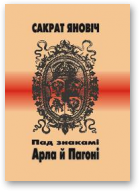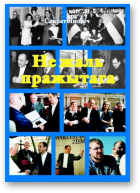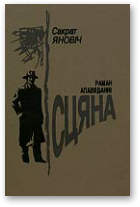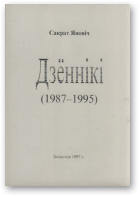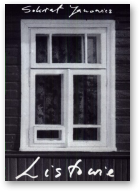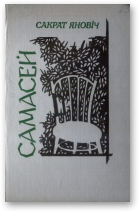- Home Page
- What’s New
- Books
- Audiobooks
- Periodicals
- Radio auditions
- Music
- Video
- Plans
- BHA’s Catalog
- EEDC’s Catalog
- Shop
- Skaryna’s Catalog
- MiOKB’s Catalog
- Private Catalog
- Belarusian Authors
- Belarusian publishers
- Publishing series
- Belarusan Emigration Collections
- Aphorisms
- Our banners
- About Us
- Partners
- Search/ Catalog
- News Archive

|

|
Доўгая смерць Крынак
Апавяданьні, аповесьць
Яновіч Сакрат
Publication Place: Беласток – Бельск
Publication Date: 1993
Editor: Максімюк Я.
Publishing/ Printing House: АМЭГА
Sizes: 262с., 21см
Category: Belles-Lettres; Memoirs
Copyright © 1993 by Сакрат Яновіч
Book Collection: KAMUNIKAT — this site (online version); BTH — the library of the Belarusian Historical Association, ul. Proletariacka 11, Białystok (hardcopy); EEDC — the library of the East European Democratic Centre, ul. Proletariacka 11, Białystok (hardcopy); MiOKB — the library of the Belarusian Culture Community and Museum, ul. 3 Maja 42, Hajnówka (hardcopy); private library in Bialystok (hardcopy)
Copy Numbers: BTH — [51], [52]; EEDC — [1648], [1648-2], [1648-3]; MiOKB — [3757], [4827], [4828], [9758]
Call Number: Ш-1, П-2, IV.1.Jan
In his book Krynki’s Slow Extinction the author predicts the extinction of his native village, its apocalypses. The village of Krynki near the Polish-Belarusian border has a long and complex history. It was inhabited by ethnic Belarusians, Poles, Jews and Tatars. All Jews have left leaving an old synagogue and memories behind. Memories die together with its senior inhabitants who lived there at the time. Few babies are born in Krynki and more people die. The village is dying too. Optimists hope that the flight of young people from Krynki would eventually stop and the place would survive and prosper. They hope that its residents would not forget the local language. But this is an illusion. The village is dying slowly like many other villages in Podlasie. They are fading with every death of a senior resident. It hurts to observe it, especially if this is you native village, and when you know that nothing can stop the process. The agony draws closer but it will not come soon because Krynki dies slowly. (N.H.)
Belarusian Authors: Яновіч Сакрат
Catalog: Kamunikat.org | BTH | EEDC | MiOKB | Прыватны кнігазбор
Contents
Адпомста Івоны
Бавантур
Бацькаў дом
Вёскішча, багіня ганьбы
Восеньскае сонца
Выезд у смутак
Вялікдзень 1971 году
Вяртаньне Мардаціка
Галячыха
Гутарка з маці
Дзеці з Гаркавіч
Доўгая сьмерць Крынак
Занатоўкі для памяці
Ключ
На ёлцы ў вясковага інтэлігента
Настуся-пані
Несур'ёзны лёс Пятра
Пажар у Дужага
Пахаваньне Ганьдзі
Петрыкаў дабрабыт
Росквіт i ўпадак Бядоціка
Спатканьне
Страшны канец Антона
Сьлед Сікеля
Сьцяна
Шчасьце Вусатай
Эпізоды фронту
Worth reading:
Мініяцюры
Яновіч Сакрат
Miniatures are one of the hallmarks of Sokrat Janowicz's work. These short texts, even though written in prose, because of their lyricism, emotionality and the extraordinary language harmony are on the border of poetry. In a condensed form, the writer talks about the vanishing world of the Belarussian countryside, spiritual motherland, loss and duty of remembrance, using the speech which he calls his religion. Thus he enchants them, as ... More »
Хатняе стагоддзе
Яновіч Сакрат
The Domestic Century is a book of reflections and a timeline. Sakrat Yanovich, as he himself admitted, writes carefully polishing every word and every sentence to make sure that even a short expression carries a full spectrum of images, feelings and ideas. He does not waste words or create extensive and long descriptions of some occurrences. He uses few, carefully selected and polished words to fully express what is on his mind, but h... More »
Пад знакамі Арла й Пагоні
Яновіч Сакрат
Under the Eagle and Chaser Symbols is a research paper. Sakrat Yanovich stresses that Belarusian culture emerged in the Grand Duchy of Litva and shaped later in Rzeczpospolita. He questions the assertion that the Belarusian people are a small brother in the Slavic community. Russia and Russian culture had little influence on the formation of the ethnos and culture of the Belarusians. The ethnos shaped under the influence of Polish and E... More »
Не жаль пражытага
Яновіч Сакрат
Nothing to Regret Sakrat Yanovich In Nothing to Regret Sakrat Yanovich reflects on his past. At times it is easier to lay bare one's heart before a stranger than tell loved ones about a small incident. Sakrat Yanovich had courage (which is rare) to tell the world about his life, 50 years of creative work. Although he may not be happy with all he did, he does not blame himself and does not regret about his life. Every one of us liv... More »
Дзённікі
(1995 – 2000)
Яновіч Сакрат
Almost everyone writes diaries. Everyone at least once in his or her life takes note of his thoughts, feelings and reflections. Girls especially like to write down and share their secrets. The “kids’ fun” usually passes together with childhood and adolescence. Sakrat Yanovich’s diaries are a timeline of events, a timeline of life seen through the prism of the author’s outlook. The author took down his observations, reflections, compar... More »
Запісы веку
Яновіч Сакрат
Як толькі перастаў я поўзаць малечаю па хаце i пачаў хадзіць, памятаю акно. Яно вабіла мяне святлом i таемнымі гукамі. Даставаўся я да яго з бядою, але неадступна. Ужо прадчуваў i нават разумеў, што свет не канчаецца ў сенях, i аднекуль заходзяць да нас людзі, цёткі з дарункамі цукеркаў. Мне вельмі хацелася ўбачыць — менавіта — адкуль яны i як; a яшчэ, якія ў ix хаты, бо чуў, што таксама маюць свае... Акно снілася. Тады я вылятаў цераз ... More »
Сцяна
Раман. Апавяданні
Яновіч Сакрат
The book includes Sakrat Yanovich’s novel The Wall, as well as his stories. A Belarusian writer who was born and lives in Poland’s Bialystok area, Yanovich is well-known for his stories. In this book, he tries himself as novelist. His main character Sumlenevich is a man who believes in a victory of good over evil. The author, whose life was quite tough, full of evil and lawlessness, shows how difficult it is to believe in truth an... More »
Дзённікі
(1987-1995)
Яновіч Сакрат
Як празаік С. Яновіч дэбютаваў у 1956 г. на старонках беларускага штотыднёвіка „Ніва”. Аўтар зборніка апавяданняўі мініяцюр „Загоны” (Беласток, 1969), аповесціпра К. Каліноўскага „Сярэбраны яздок” (Мн., 1978), кніг „Думкі пра аўтаномію” (Беласток, 1981), „Праваслаўная царква ў Беластоцкім краі і беларуская мова ў ім” (Нью-Йорк, 1984), „Самасей” (Мн., 1992), „Доўгая сьмерць Крынак” (Беласток; Бельск, 1993), „Лістоўе — лістове” (Беласток,... More »
Лістоўе Listowie
Яновіч Сакрат
Я свечкі запаліў, у пакоі цішыня велікодная. Бачу Бацьку... Крынкі халаднаногія! Іду ў даліну пачатку свайго — готыка дзяцінства на небакраі. На вашых выганах бесклапотнасці і ў вішнях радасці рэха загуляла са мною ў схованкі. Чырванею, засаромлены сталасцю. Крынкі вячэрнезвонныя! Кіра-пані хараством візантыйскім сваім не асудзіла мяне на будзённасць. More »
Самасей
Аповесць, апавяданні
Яновіч Сакрат
Andrey Antoshka, a Bialystok-based engineer, is the main character of the story Samasey. The book is about twists of life, an understanding of the world through the prism of an ordinary man, his philosophical reflections on the meaning of life and human existence psychology in general and every person’s existence in particular. The author’s rich colorful language makes it hard to stop reading the book. Apart from the title story, the b... More »







